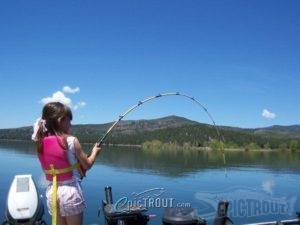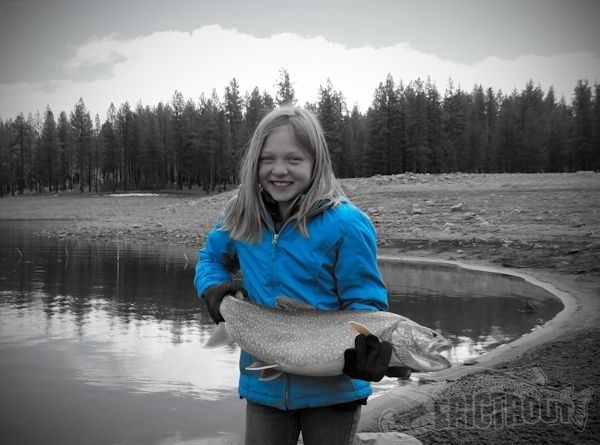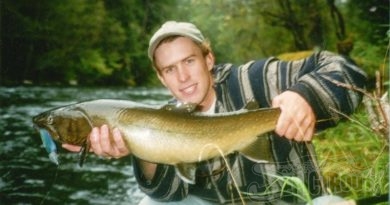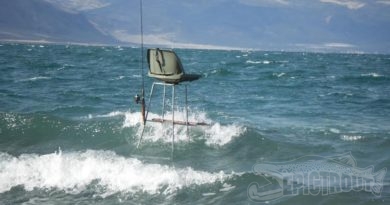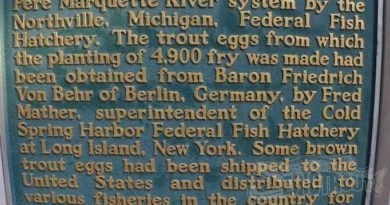Stages
Time after time I have been told that there are three stages in trophy trout fishing. All anglers experience these stages as their skills are perfected the longer they fish.
The first stage is when all you want to do is catch a fish every time you go out. We have all been there and at times this stage can be very frustrating especially if you come home empty handed after a long day fishing.
The second stage is when your goal of catching a fish turns into consistently catching numerous fish. This stage can last for a few years or decades. The second stage is also known as the “limit on a stringer stage” and it is by far the most popular stage among anglers. In fact, some anglers are so comfortable at this stage that they never leave.
The third stage is the hunt for trophy’s. This angler would rather catch one big fish than a boat full of smaller ones. Trophy anglers will put in hours, days or weeks per season just to catch one trophy trout. Here is a little fishing joke for you regarding to the 3rd stage mindset. A angler catching a fish of a life time and someone congratulates him by saying “Good job.” The angler wipes his forehead as he replies, ” It is a job!” In the third stage, the size and quality of the trout targeted are actually in the top 5 % of all the fish that are in the lake, river or stream. Very few anglers master the third stage. I have met countless trophy trout anglers who, after catching one or two big fish, retire from fishing altogether and move onto other sports. The main reason for moving on, per most of these anglers, is the same reason most runners only run a triathlon once in their lifetime. It’s hard and the race itself is not fun. It’s the pot at the end of the rainbow that they really want. Now that they have done that, it is time to move on.
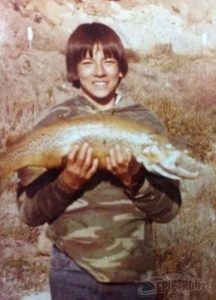
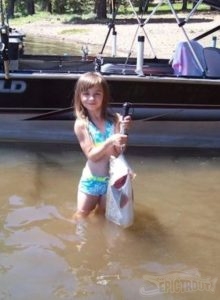
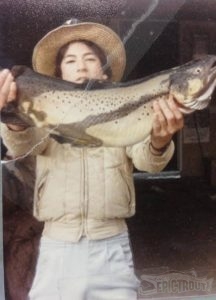
I have personally seen and experienced a fourth stage in trophy trout fishing. It’s when an angler just wants to get back to the basics. Maybe the angler has already caught trophy size trout and still has the love of fishing. When my father had me, he was in the forth stage of his fishing life cycle. My father had enjoyed fishing all his life. Growing up during the Great Depression, anything that he caught would be very much appreciated at the dinner table. Catching fish for food was a necessity not just a hobby. After joining the military and fighting in World War II, my father found himself stationed in a remote location in Austria installing radio towers. He told me that one time their food supply was in dire straits and all they received from the base for two weeks was powered eggs, powered milk and mustard. The near by rivers, creeks and lakes were loaded with trout. Once again my father found himself fishing for food rather than for sport. The ability to catch fish allowed my father along with a few others, the opportunity to skip work detail and catch trout to help supplement the team’s meals. After fighting in World War II and in the Korean War, my father decided to retire from the military, but not from fishing. My father was 50 years old when I was born. Once I was old enough to start fishing with him, my father entered the fourth stage of trophy fishing. My father spent more time educating me than fishing himself. By the time I was 14 years old, I had more than my share of reeling in trophy trout that my father hooked than most anglers had the privilege to reel in during a lifetime of angling. I consider myself blessed to have had such a great teacher. The fourth stage of fishing for my father was less about fishing and more about spending quality time with me and sharing angler education and a little on the philosophies of life. There is something magical that happens in the slow times of fishing. All your senses are heightened and you seem to notice everything such as a seagull hovering in the distance and small fish dimpling the water’s surface. You start to notice that trees are made up of multiple colors and not just green. You also gain the ability to digest and comprehend what someone with a lifetime of wisdom has to share. This is a place where a parent could plant seeds of wisdom into an adolescent mind without talking down to them.
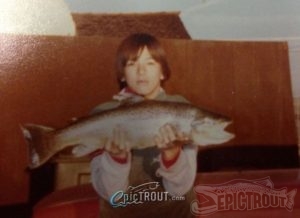
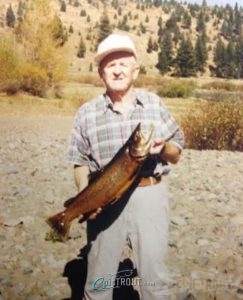
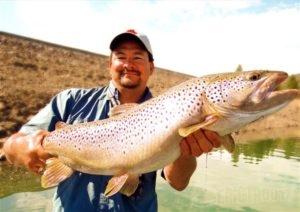
I can clearly remember at the end of one fishing trip during the fall knowing we would be done for the season. “Dad, I wish we could by pass winter and go straight to spring so we can go fishing again.” He replied, “Don’t wish your life away son. Make the most of every day. There are ways to still be fishing even when you can’t be on the water, a state of mind, it’s a life style. Take the down time and use it to your advantage. Read everything you can about trout. When spring comes you will have a few tricks up your sleeve.” This life lesson has helped me in so many areas in my life outside of fishing. The truth is that had we been watching TV instead of fishing on the water and fully focused on what was going on at that exact moment in time, I could have missed that message all together.
“Akzeptabel zu der Zeit aber nicht heute” is a phrase that Germans use to describe something that was commonly done and socially accepted in its era , but is not acceptable in today’s modern times. Consider the cigarette advertisements of the 50’s or the mullet hairstyle of the 80’s.

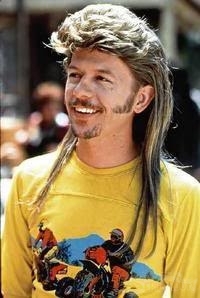

Several of the photos in this article are from over 30 years ago. Long before Al Lindner and In Fisherman started preaching catch and release, my father’s generation kept every fish right up to their limit. Once they reached their limit, they were done fishing for the day and it was time to go home. They ate every fish they caught. I had a hard time convincing my father to catch and release fish. He never understood why I would release a perfectly good meal. Every time I released a fish he would say “Why are you educating that fish? You are making it harder to catch that fish next time and you will go home hungry.” That is the old school way of thinking about fishing. Fishing was more about catching the meal than about the sport. So here I am with mix emotions. I think fresh fish are delicious and I enjoy eating them but I definitely feel like I am more of a catch and release type fisherman. I harvest a fish now and then but only if I am able to eat it fresh within a few days. So to anyone who finds the photos of the dead fish on stringers posted with this article disturbing, I understand and reply with “Akzeptabel zu der Zeit aber nicht heute.”
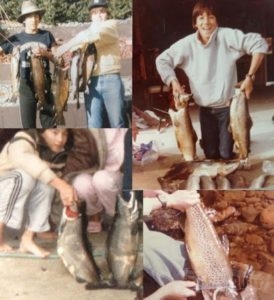
My first glimpse of the fourth stage was about a decade ago when I started looking forward to fishing with my own children, just like my father had with me. The process is similar to teaching a child how to ride a bike. After you remove the training wheels, you find yourself praying, hovering, coaching, and cheering “You can do it”all at the same time as you let go of the bike seat. The mix of excitement and fear pumps through your veins with each turn of their bicycle pedal as they swerve down the street. Then, it happens one day when your child instantly transforms into Evil Knievel. The mind of a child is an amazing place. They truly believe anything is possible. I asked my youngest daughter Ashley what she wanted for her birthday and she replied “To go fishing with you, dad!” Grinning from ear to ear I replied “Ok, anything you want.” I thought to myself, “This is easy, I can do this, no problem. It’s not like she is asking for a pony.”. Then Ashley’s next statement chilled me to the bone, “And I want to catch a WORLD RECORD fish just like Katie caught.” “Oh no!” I thought, “not her too!” The Evil Knievel syndrome is back!
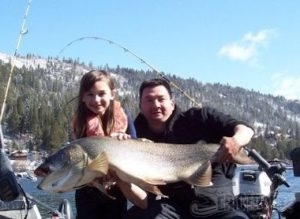
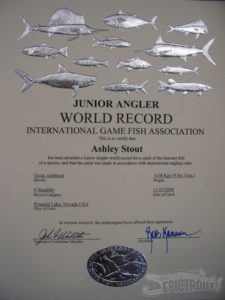
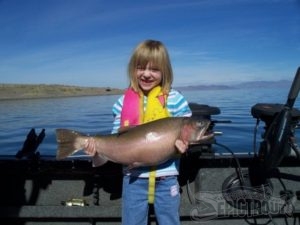
Nowadays, I often go back and forth between the third and fourth stages of fishing. Each year, I pick three different times when I can fish solely for trophy trout. The rest of the year is spent fishing with two of the best fishing partners a dad could ask for, my two daughters, Katie and Ashley. I take each of my daughters fishing separately from the other. This allows me to share quality time with each of them separately. When fishing, my kids have learned most of the techniques needed to fish for trophy trout including driving the boat and working the sonar. We talk about which lure and color of lure would work best under the current conditions in which we are fishing. The girls choose their own lure, attach it to the downrigger, if needed, and they let out their own line. This allows them to be more than just a bystander waiting for a fish to bite at the other end.
When I go fishing with my girls, its not all about catching fish, its much more. It’s a time for us to reconnect and have real conversations about what is going on in our lives without being interrupted by or preoccupied with daily distractions. It’s a time for us to share stories and create long lasting memories while we wait for the fish to bite.
Whatever the stage of fishing you are in at the present time, enjoy it. There is always something new around the corner. Hmmm, I wonder what the fifth stage is going to be?
